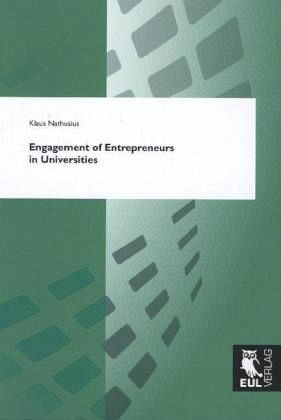Nicht lieferbar

Engagement of Entrepreneurs in Universities
Versandkostenfrei!
Nicht lieferbar
In autumn 2011 EFER took the initiative to organize a workshop at the EFER Alumni meeting at St. Gallen University. Through a brainstorming session an amazing number of ideas for improvements of the entrepreneur-university relationship have been identified. Therefore the author, member of the EFER Governing Board, decided to write a book on this essential subject. A major part of the book is the entrepreneur-university relationship. Alumni of entrepreneurship oriented universities often engage in new ventures early on in many cases in teams. New companies proceed along the corporate life cycle...
In autumn 2011 EFER took the initiative to organize a workshop at the EFER Alumni meeting at St. Gallen University. Through a brainstorming session an amazing number of ideas for improvements of the entrepreneur-university relationship have been identified. Therefore the author, member of the EFER Governing Board, decided to write a book on this essential subject. A major part of the book is the entrepreneur-university relationship. Alumni of entrepreneurship oriented universities often engage in new ventures early on in many cases in teams. New companies proceed along the corporate life cycle trail. Later on entrepreneurs might be approached by a larger company regarding a potential sale of the company and after selling the company start looking for a new challenge. At this stage the Alma Mater might approach the entrepreneurs and might offer to provide some of their experiences to the university. The entrepreneurs might give lectures on starting companies and growing them alongthe life cycle trail. They might develop new business ideas together with students, they might be willing to mentor or even coach student teams starting companies in certain branches of industry. Within the last 10-15 years Entrepreneurs-in-Residence (EIR) have been appointed by universities in many countries. These incorporate classic concepts of using the expertise and network of seasoned entrepreneurs to assist in setting up and mentoring new ventures. EIRs can be a highly efficient instrument for supporting students as potential entrepreneurs and nascent entrepreneurs at universities. Engagement of Entrepreneurs in Universities is an in depth introduction to university programs world wide on successfully engaging entrepreneurs in entrepreneurship oriented universities. More than 120 universities and programs in 18 countries are mentioned.




